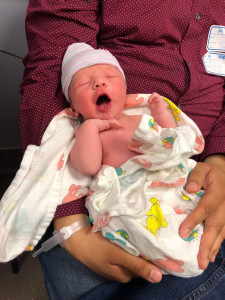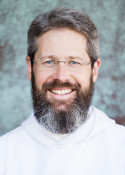FROM THE RECTOR
A Strange Way to Love
I have been a priest for many Ash Wednesdays. And each time I participate in this day I am reminded that the ritual of placing ashes on someone’s forehead is a very strange way to tell your friends that you love them.
It’s an unusual ritual in our culture, to smear carbonized plant leaves onto someone’s forehead in the shape of a cross. And yet, this physicalized way to remind ourselves that we are mortal—in spite of all of our beliefs to the contrary—each time ends up being one of the more moving worship services I experience.
Some of this is because of the intimacy of the ritual. There are very few occasions in our culture when it is appropriate to touch one another person, especially a stranger. And then, on this day, I look a stranger in the eye, remind them that, “you are dust, and to dust you shall return,” while carefully placing ash in the sign of a cross on the head. That doesn’t often happen.
It is even more moving/disturbing/profound to offer this ritual to people that I do know. At the first service of the day, our 7am service in the chapel, one of the first to receive ashes was a baby that we baptized a couple of months ago. There she was in the front row, burbling happily with her dads, her godmother alongside. Marking her mortality was jarring, discomforting. And all too real.
Then, as the day went on, it became more and more real, as people came forward who have recently gotten challenging medical diagnoses received this ashen reminder that they are all too familiar with. It’s one thing to be reminded that one day we will die, another entirely to receive that when the path ahead looks so uncertain.
This year also marked the return of a practice that we started last year by necessity. At the early service last year, when Liz and I realized that there was only one silver shell with ashes on it, we made a decision to simply place the ashes in our hands. Which, not surprisingly, is messier. And, not surprisingly, feels much more real. There’s no beautiful container to distract us from this clarion call to wake up to our mortality. Not so that we obsess about our death, but so that we remember to live.
If this was simply about death, then it would be an exercise in nihilism. But the very same space that we kneel around to receive ashes, one liturgical turn later, also serves to remind us of the essential hope of our gathering—ultimate communion with God.
And that, I suppose, is what allows me to brave the depths of Ash Wednesday, that even on a day when we gather to remember that we will all return to the dust, we also gather around the table to be fed and loved, strange as it may be.
Peace,
Phil+
Lent 2019 Will Still Involve Dessert
 I have always been under the impression that Lent practices work like this:
I have always been under the impression that Lent practices work like this:
Take something that you love or use often. For example: dessert, Facebook, using your car, watching television during your (minuscule) free time, occasional take-out. In a self-flagellation moment, name it and then, for the entire spring, DENY THYSELF SUCH LUXURY. In this way, you will know what Jesus felt when he met Satan. You must earn your Easter chocolate.
This was the impression that followed me into the Parish Hall last Sunday for the final Lent adult formation class. Sheryl Fullerton invited us to make a few lists and as soon as she told us to write down what we were most resistant to in our spiritual path, I knew where she was going with it.
Ugh, that’s the thing she’s going to make us do, I thought. We’re going to have to commit to one thing we’re resisting and do it for Lent.
And to be honest? That made me a little cranky.
See, I have elaborate practices of goal setting, self-motivation guidelines and daily routines, both in my work and at home. In fact, I try hard to pay attention to what calls to me with ease – and then I lean towards it. Ease, to me, is a sign that something’s ready to bloom.
So the feeling that I should be forcing something resistant into my life this spring? Boo. I was ready to once again pass up Lent and see everyone next on Easter Sunday.
But Sheryl didn’t make us commit to forcing what’s not working. She left things much more open-ended and when I left to get my kids at Sunday School, I didn’t have a Lenten plan. But I wasn’t against one either.
In the days since then, I have been caught up reading a book by a woman named Byron Katie. I have mixed feelings about some of her stuff but one thing has stuck with me. Katie teaches that there are three kinds of business in the world: my business, someone else’s business and God’s business.
Worried about the weather, how it seems to be rainier in Berkeley than in Seattle these days? Chill out, that’s God’s business.
Wondering if your uncle has made the wrong decision about when to retire and will he be bored and what about his 401k and how can you help? Umm save your stress, that’s not your business, it’s his.
In the end, as it turns out, a whole lot of stuff that preoccupies our minds and fills us with worry is, simply, not ours to hold.
My job as a coach involves me in other people’s business constantly. It’s hard to turn off the fixer/helper/worrier/strategic thinker part of me. But learning Katie’s concept of “whose business are you in?” has given me some moments of freedom this week and, paired with Sheryl’s invitation on Sunday, I find myself with a new Lenten practice this year.
This year for Lent, I am only going to worry about my own business. Every day, as hard as it may be, I will only allow myself to stress or worry about something that is in my immediate vicinity. God can handle God’s stuff this spring and everyone else can be their own adults. The temptation to empathize myself into burn-out is what I will resist.
I like the subversiveness of this approach. It’s like mental fasting and maybe it oddly even falls into the category of self-care. I think Jesus would like it. (Can I be that bold?) He always seems to be telling people to stay in their own lanes, to focus on doing work on themselves, trusting that the rest will follow. I don’t think he’s wrong.
If you see me on Sunday, pull me aside and tell me what you’re doing for Lent. I’m curious to hear and love the idea of such diverse interpretations under the same roof. But after I hear about it and give you a high five in solidarity, I’m going to let you worry about it. Cause during this Lenten season, that will be your business, not mine. 🙂
— Jen Dary
Listen’in: Heart of Lent 2019 Reflections
 The people who each week deliver their bared hearts in service to All Souls have asked me to open mine in this Lenten Reflection. As I sit to write, I am reminded of Rembrandt’s nine foot painting “The Apostle Paul” at the National Gallery of Art. After a confrontation with Christ, who put a full stop to his crusader-like self-righteous sword slashing, Paul now sits in this depiction agonized, pen in hand. He is in darkness and only his suffering right eye, sword now hung on wall, and right hand with pen are visible. He must write not from mind’s already knowing, but with God’s help from what his Soul wants him to know. He can no longer act out contrary to all that offends him, but is called to discover what in-vites him.
The people who each week deliver their bared hearts in service to All Souls have asked me to open mine in this Lenten Reflection. As I sit to write, I am reminded of Rembrandt’s nine foot painting “The Apostle Paul” at the National Gallery of Art. After a confrontation with Christ, who put a full stop to his crusader-like self-righteous sword slashing, Paul now sits in this depiction agonized, pen in hand. He is in darkness and only his suffering right eye, sword now hung on wall, and right hand with pen are visible. He must write not from mind’s already knowing, but with God’s help from what his Soul wants him to know. He can no longer act out contrary to all that offends him, but is called to discover what in-vites him.
My first Lent at All Souls engraved in my heart a shatteringly sweet memory of Liz+ and Phil+ in white robes, kneeling and drying the floor where they and we had washed each others’ feet. We as Body of Christ had touched each other, served each other with humble and equal love. I had to abandon my idea of Episcopalians as haughty high church stuffed robes. This was real church, where I and everyone, everyone, everyone was welcome.
When Kaki asked our first Heart of Lent class if anyone at the table had an experience of Lent that had touched them, I responded that I had wept throughout last year’s Lent. She gasped in sympathy and I quickly added: “Not from sorrow, but tears of contrite joy that Jesus the Christ had lived as us and given all so we could transcend death. Each week we eat His body, but I heard that actually He is eating us, removing from us all that cannot resurrect with Him. All that is unloving.” There, I had said it. The D word. Death as enemy, death as portal, death as friend. How to deal with death when death is the dealer? Does death have all the cards? I had evaded deep encounter with All Souls Fr. Michael as I knew he was the chaplain at Kaiser, where I will likely some day need his loving service in meeting death. I have only recently discovered my own mortality, now watching body and mind dissemble. When I confessed this to him, he suggested kindly that it was time to face death. He told me of St. Francis’ joy in welcoming Sister Death. May I also be so Graced. A class on death with Michael+ would be welcomed here.
So now at Lent I come to looking at what is dead in my current so-called ‘life’. During the final Heart of Lent class Emily (+, who has ministered to the growth of my faith in Christ always and all ways) asked us what is easy as a Lenten spiritual practice, and to what practices we are resistant. I quickly wrote that reading the lives of Saints is easy. Other’s lives. Difficult is finding my own life, my own creative story. Surrendering the out-grabbing of constant entertainment. Television, books, Facebook, even reading while eating in my greed for the outer. I am at effect of the outer. Reactive to everyone, like in Liz+’s recent sermon on being a pushover. The Scripture on which she expounded informs us that Jacob knows he is at God’s mercy, not that of his brothers. His listen’in was surrendered to the mercy of his Lord. I, listening outwards, am at the mercy of the whole world, which is quick, like Joseph’s brothers, to sell us out. With God’s help, Richard, let go of grabbing out and listen’in for Lent. Invest your hours discovering what might spring up from within you. You might find that you also, like Jacob, have a coat of many colors. Aspire to be like Julian of Norwich, who with folded arms, contrary to none, surrendered to her Lord and found peace. As that great Bluegrass lyric goes: I pray that when I’m done, all that’s left is Jesus’ love.
— Richard Page
Room at the Table

Last Sunday we heard Luke’s account of The Transfiguration in which Jesus prays with his disciples and becomes transformed, enlightened as manifest by a splendid white light.
In his enlightened state Jesus speaks with Moses and Elijah of his departure or exodus in Jerusalem. His Exodus, like Moses’ before him, places his story, the Christian story in the arc of a liberation struggle in which all can be free from tyranny.
Jesus comes down from the mountain transformed and yet mindful of the sacrifice to come. Enter a boy with seizures, and a father desperate to help him. Jesus moves to his side. By now in the New Testament we have seen blind people regain sight, people with paralysis walk, and dead people live. Now it’s the boy with the demon of seizures.
I listen from my wheelchair and follow along with the message as the demons are cast out to make our liberation possible through Christ’s healing love; I understand Jesus invites us to help each other cast out the isolation that can come when we suffer or are in pain, when we feel less than, or want to hide our wounds. I agree that stigma and prejudice and isolation are best cast out as everyone is invited to the holy table.
My problem, perhaps is with the literal cure. For me, the notion of the cure is the oppression as it implies a condition between me and my wholeness as a person with a disability. I know I am not the only Christian who quietly rolls her eyes whenever a ‘cripple’ is healed, or the ‘halt’, ‘lame’, or blind are cured in Scripture or in a hymn. No offense intended.
None of the hundred or more disabled people I know welI spends time thinking about cures or being fixed. Wheelchair repair, civil rights, accessible homes and beaches, perhaps. Our families, faiths, jobs, friends, politics, definitely. We are engaged in our various communities, supporting each other, changing laws and attitudes, on the way toward liberation with all exiled communities and God’s help.
Disability is as old as humanity. To the extent that disabling conditions translate into exclusionary attitudes or awkwardness or patronization, we are not yet free.
Whether cures emerge or miracles happen we are here, demons and all, on a path toward justice; my faith tells me that the table has room for us all.
— Jenny Kern
Congratulations!
 Please join in welcoming baby Nicolás Diego, born to Nettie and Daniel and big brother Lucas last night. Everyone is well!
Please join in welcoming baby Nicolás Diego, born to Nettie and Daniel and big brother Lucas last night. Everyone is well!
Daylight Saving Time
Don’t forget we “spring forward” this weekend — set your clocks ahead on Saturday night or you’ll miss all the fun!
Soup + Story
Throughout Lent, we gather for Soup + Story: a time to meet weekly in each others’ homes to study the Bible, share our stories, and eat soup. It’s a great opportunity to get to know other folks, and to be known by other folks in the church. If there is a silver-bullet to getting involved here or diving a little deeper, this is it. The groups meet on different nights during the week, so you get to pick what night works best for you and/or your family. This year we will dive deeper, through images and story, into the lectionary from the previous Sunday and into the sermon that was given on that Sunday. This is meant to be a full-family event, so feel free to bring your kids along (if the group is noted to be kid-friendly!). Any questions? Or need help finding a group that fit you/your family? email Emily, emily@allsoulsparish.org.
Click here to sign up!
CAMP ALL SOULS – REGISTER NOW!
This summer we are bringing back Camp All Souls, a week-long day camp for kids to adventure, connect, explore, learn, play, create, question and more, all right here at All Souls. This year the camp will be August 12 – 16. It runs from 9:00 am to 3:00 pm and is for kids ages 5 to 11, who have completed kindergarten through fifth grade. Cost is $150, and scholarships are available. Once again, we will be welcoming middle and high school students to help lead the week, as well as adults who want to pitch in – it is a whole community affair! You can learn more and register online here or pick up a paper registration form in the narthex.




